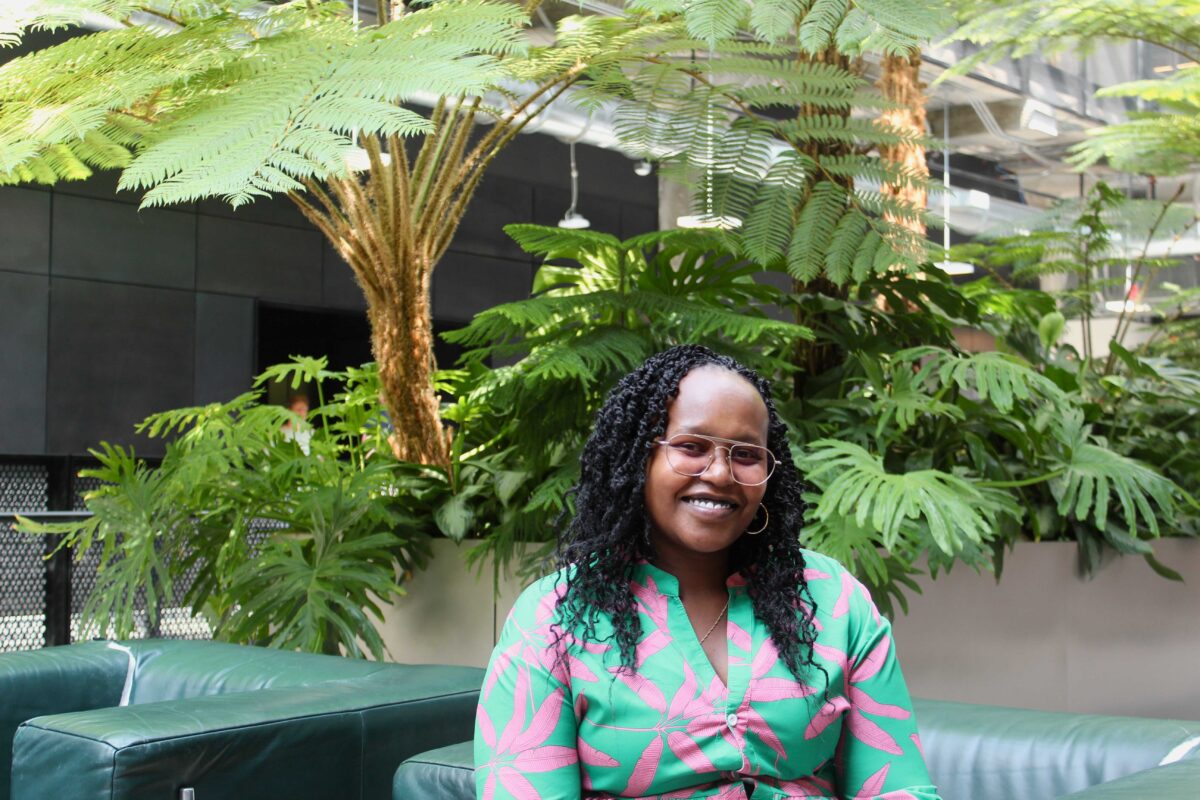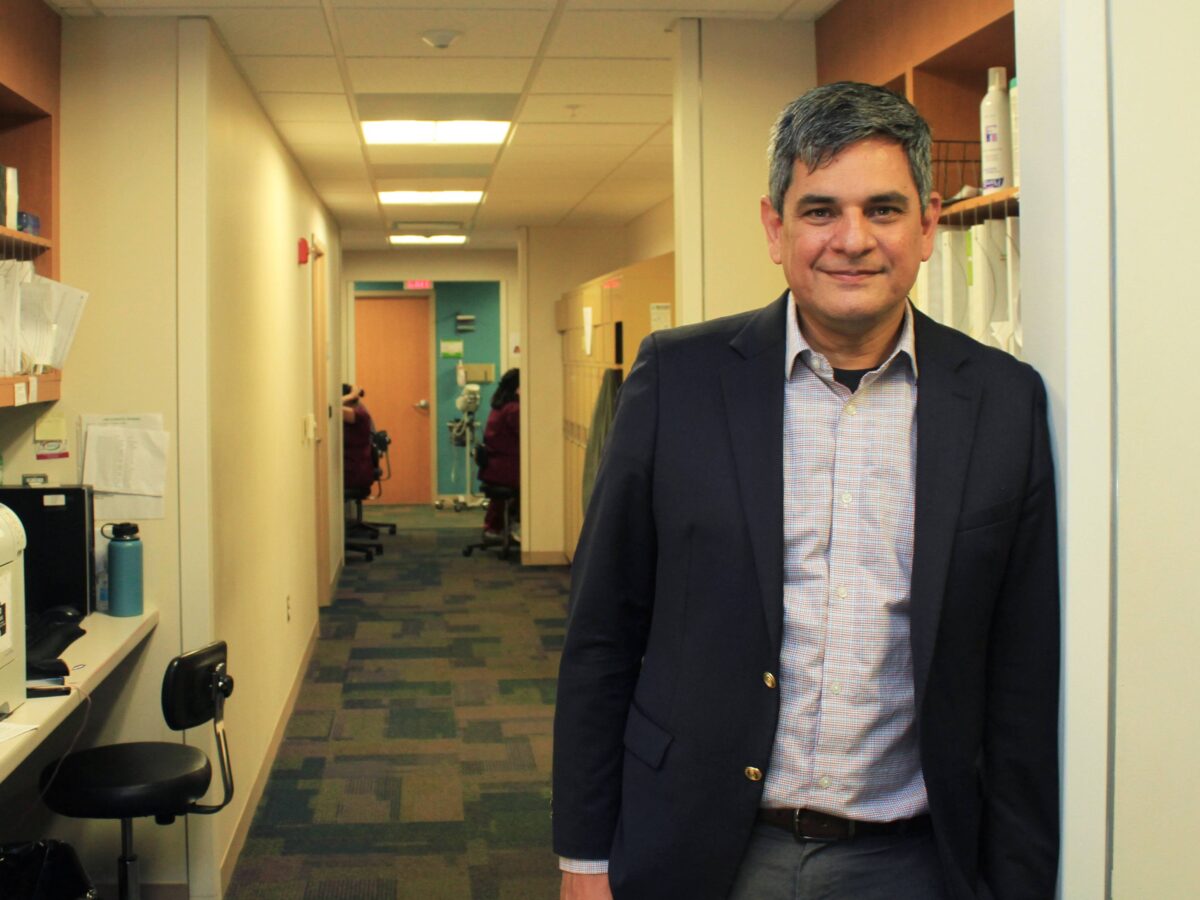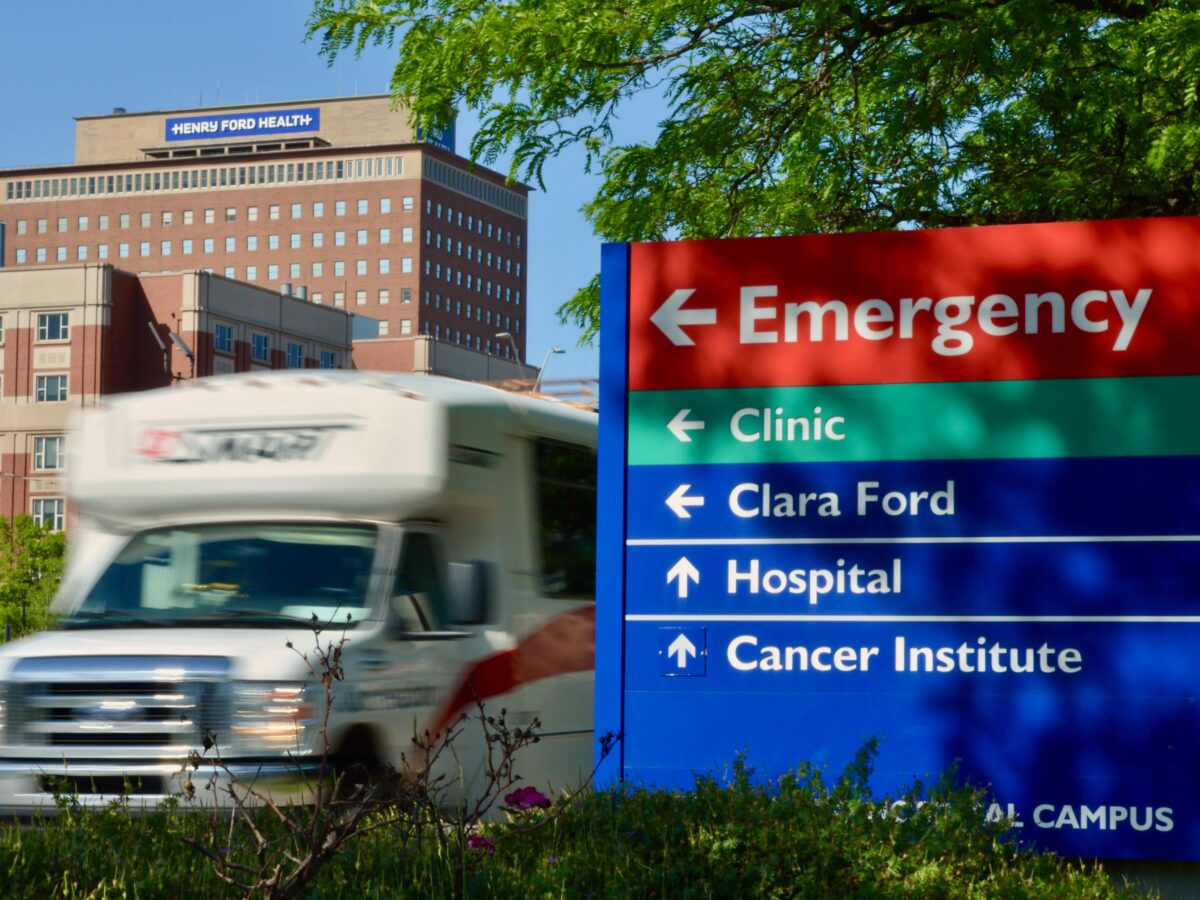Overview:
-Mary-Jacqueline Muli, a cardiac ICU nurse at the University of Michigan, says she sees the effects of climate change on patient health.
-She founded the Climate Justice Nurse to raise awareness among health care professionals.
-"We're seeing it in real time, and somebody had to sound the alarm," she tells Planet Detroit.
Over the years, critical care nurse Mary-Jacqueline Muli has weathered the anger, stress, and sadness that comes with repeat flooding events.
Born and raised in Kenya, Muli migrated with her family to Toronto while she was in high school, before she moved to Detroit for college. She’s lived in the city ever since, and within the last decade, watched as her home and the home of her neighbors on the city’s west side have become submerged every few years in knee-high water.
Muli sees the increasing health, particularly from prolonged exposure to mold and particulate matter, and environment-related impacts inflicted on her community and patients, she said.
In her day job, Muli is caring for critically ill patients: individuals whose conditions, she said, are oftentimes worsened by “something in the air, in the water, on the surfaces that you’re sleeping on.”
In 2024, Muli founded the Climate Justice Nurse, an organization aimed at addressing the impact of climate change on public health. Through education and advocacy, she lectures health care professionals, and partners with community organizations such as Feed Your Neighborhood and Detroit Area Disaster Recovery Group to promote environmental justice and advocate for access to healthy homes.
Muli spoke with Planet Detroit about her career as a nurse, her personal relationship to climate change, and how she hopes to encourage prospective health care professionals to advocate more openly about the growing health impacts of climate change. This interview has been edited for brevity and clarity.
Tell me a little bit about yourself?
I’m a cardiac ICU nurse. I work at the University of Michigan. At any given time, I’m caring for one of the sickest hearts in the state, and so I know that in my 10 years of nursing that our patients are much younger and much sicker.
I’m convinced that climate has something to do with this because as the climate is shifting, our health has shifted. We’re not adapting as quickly. Our bodies can adapt to change, but the climate is changing so fast that we don’t have a chance to adapt, and so you can’t put a healthy body in an unhealthy environment and expect it to thrive.
You’ve worked as a nurse for a decade. When did you start to pinpoint the health effects of your work to what was going on in their environment?
The wake of the 2021 floods is when I really got activated. We were in the middle of COVID, and Detroit at that time was in the middle of one of its worst outbreaks, so our homes were flooding and nobody could really come and help us.
Within our bubbles, we tried to help each other as much as we could by just going to each other’s homes and dragging stuff out of the basement and crying because you find all kinds of memorabilia.
That’s when I got activated because I was like, ‘this cannot be healthy for us.’ Our water comes into our homes. It recedes. FEMA comes. They couldn’t come into our homes in 2021 to see the damage to our basements, and so we were underserved.
Detroit has not recovered. We had another big flood in 2023 …our homes are taking a beating. Even if you can remediate your home, we’re still waiting on the city to fix their infrastructure.
What did you start to do after that experience?
I started going to City Council meetings…(District 1) Councilman (James) Tate’s coffee times. I pulled up every single time and started to engage him and the local government about the things that were happening in our community. It was mind blowing, because I’d be like, ‘Hey, our basements are flooding,’ and nobody wanted to reveal that they had musty basements.
It was so traumatizing for people. I lost all my wedding pictures back in the flood of 2014. People lose food whenever we have flooding … people lose their furnaces. It doesn’t even matter what we lose in the flood anymore. For me, what’s most important is how this is changing our health.
Detroit has some of the highest asthma rates in the country, especially for adults. If you hear an adult acquiring asthma, it’s mostly likely because of the air quality in their home. When you have mold inside your house and you’re breathing this stuff, it damages your lungs.
I live a mile away from a concrete crusher, where the dust always ends up on my windowsill, so I can’t even open my windows. It makes for a really scary story, and I think a lot of times people don’t want to talk about it, because they don’t know what the solution might be. But if you don’t talk about it, we will never get to a resolution.
When did you envision the Climate Justice Nurse?
I was going to these community meetings and I started to wonder: where’s health care in this space? Where are the nurses? I Googled the ‘climate justice nurse,’ because I was like, ‘there has to be a climate justice nurse.’ And nobody popped up. And I was like, I guess it’s gonna have to be me.
Does it feel like speaking up about climate change is taboo in your profession?
When I first started talking about climate and health, I expected nobody was going to listen. But I’m so bold with my advocacy that everybody at work knows what I do.
When we round with patients, we have the attending (doctor), a fellow resident, an intern, a social worker, a dietitian and pharmacist, and then the nurse. Everybody has the opportunity to speak and I always bring up climate change. Now they are conditioned to understand that if you’re taking care of my patients, we’re gonna talk about this.
I’ve seen patients go home and come back sick. But when they’re in the hospital, which is the nastiest place in the world, they’re not sick. What is it that’s making you sick at home if it’s not a climate-induced illness? There’s something in the air, in the water, on the surfaces that you’re sleeping on. Usually they come back with organisms, either it’s mold or bacteria.
MORE REPORTING FROM ETHAN BAKULI
Trump’s Medicaid cuts put estimated 200,000 Michiganders at risk of losing coverage
The passage of Trump’s One Big Beautiful Bill Act poses a threat to the health care of hundreds of thousands of Michiganders with the potential loss of Medicaid coverage and federal funding jeopardizing community health centers like CHASS in Southwest Detroit.
GLWA work creates confusion over discolored Detroit drinking water
Detroiters on the lower east side and downtown experienced temporary water discoloration due to valve operations at the Water Works Park treatment plant. While the water remained safe to drink, not all residents in the affected area of the city were notified.
Detroit roasts as heat index reaches 104 degrees: When will temps fall?
Detroit’s heat index was projected to reach 104 degrees over the course of Monday. The heat index measures what the temperature feels like to the human body when relative humidity is combined with the air temperature.
What about your upbringing influences how you approach climate change?
I’m one of five kids. My parents were born in Kenya, and all my siblings and I were born in Kenya, in Nairobi.
I remember the first time that I actually experienced flooding, and I had to have been in the first grade. In Kenya, we had these rains that were not stopping. This had to be either 1985 or 1986, and it rained and rained and rained. And so my dad in the middle of the day was like, ‘I gotta go get my kids from school,’ because we would take public transportation to come home.
It was the first time I saw my dad cry, because he wasn’t sure that he could get his kids to safety, and he whispered a prayer, and in that light blue Peugeot 504 pickup truck he got us to safety.
When I cried when my basement flooded, I knew what he felt. You’re so helpless against this force of nature, which, of course, is caused by human activity, but you’re so helpless in that moment, there’s nothing you can do but just sit there and watch it happen.
That stuck with me, because when I got into this work, and I was like, ‘I need to be honest with myself and dig deep, and see why I feel so comfortable in this space’, it’s because I saw my dad cry. And you don’t want to see Superman cry, not when you’re 5 or 6 years old.
What’s the goal of the Climate Justice Nurse?
On top of working full time at U of M, I make time to do this because I have the capacity, and this is something that needs to be done, so I can’t just leave it to chance.
My goal is to educate and empower prospective health care professionals to consider climate change when they’re taking care of their patients. To be aware of the communities that they’re serving, because climate change is affecting how we are interacting with our environment.
As a health care professional, nobody taught me how to take care of people who had climate-induced illnesses. But we’re seeing it in the ICU. We’re seeing it in real time, and somebody had to sound the alarm.
What advice do you give to prospective doctors and nurses?
When you are taking care of the people that you have chosen to serve, understand them a little bit more. Know where they live, know the conditions of the places that they’re living in.
Understand that climate is changing their health, and when you’re giving a diagnosis, use a differential that includes climate and health.
Include the fact that they live in the dirtiest zip code in the city. They’re going back to the place that made them sick.
What can you do about that? You can get involved. You can write, you can do op-eds. You can go to their community meetings and say, ‘as a physician, I know that this is a problem because…’ But whatever you do, you can’t let these people fight on their own.





